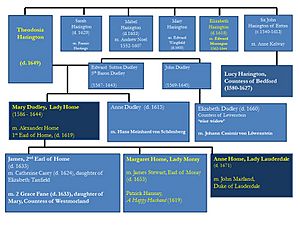Anne Sutton facts for kids
Anne Sutton (1589 – 1615) was an English lady-in-waiting. This means she was a special helper for a royal person. Anne was a companion to Elizabeth Stuart, Queen of Bohemia. She was the daughter of Edward Sutton, 5th Baron Dudley and Theodosia Harington. People often called her "Mrs Anne Dudley" or "Mistress Dudley". Elizabeth of Bohemia even called her "Nan Duddlie".
Contents
Early Life of Anne Sutton
Anne Sutton was born in 1589. Her parents were Edward Sutton and Theodosia Harington. When Anne was young, her parents separated.
In 1597, Anne and her brother, Ferdinando Sutton, went to live in Clerkenwell. They stayed with their aunt and uncle, Elizabeth and Edward Montagu of Boughton. This was a common way for children of important families to be raised.
Working for Royalty
Anne Dudley became part of Princess Elizabeth's household. This was like joining a royal team. She lived at Coombe Abbey with other young women. Her cousin, Elizabeth Dudley, was also there.
In 1605, Anne's older sister, Mary, married Alexander Home, 1st Earl of Home.
When Princess Elizabeth married Frederick V of the Palatinate in 1613, Anne went with her. They traveled to Heidelberg Castle in Germany.
Anne's Qualities and Gifts
In 1612, a writer named Henry Peacham wrote about Anne. He described her as being very steady and skilled. He compared her to Diana, a Roman goddess known for hunting. This showed how good Anne was at managing the royal household.
Anne also took part in fun royal events. In April 1612, she was one of eight ladies who gave kisses to winners. This happened at a tournament for Henry Frederick, Prince of Wales.
As a New Year's gift in January 1613, Anne received a valuable present. Frederick V of the Palatinate gave her a chain of pearls and diamonds. It was worth a lot of money at the time.
Journey to Heidelberg
After Princess Elizabeth's wedding, Anne traveled with her to Heidelberg. They arrived in Vlissingen on April 29, 1613. Other ladies who traveled with them included the Countess of Arundel and Lady Harington.
In March 1614, Anne received more jewels. This was at the christening of Henry Frederick, Hereditary Prince of the Palatinate. The jewels were worth £200.
Marriage and Family Life
Anne married Hans Meinhard von Schönberg on March 22, 1615. He was an ambassador from the Electorate of the Palatinate to England. He was also a diplomat living in Heidelberg.
Their wedding was a big celebration in London. Princess Elizabeth and Salomon de Caus helped plan a special ballet. Inigo Jones designed a beautiful hall for the castle.
Their love story was well-known. People in London heard that Schönberg came to England partly to ask King James not to send Anne away from Heidelberg. They became engaged before April 1614. Everyone knew they were in love by June 1614.
Anne had a son named Frederick Schomberg, 1st Duke of Schomberg. Sadly, Anne died of a fever after giving birth to Frederick in 1615.
In 1644, Anne's sister, Mary (Dudley) Sutton, Countess of Home, made her will. She left a purse of gold coins to her nephew, Frederick Schomberg.
 | Selma Burke |
 | Pauline Powell Burns |
 | Frederick J. Brown |
 | Robert Blackburn |


